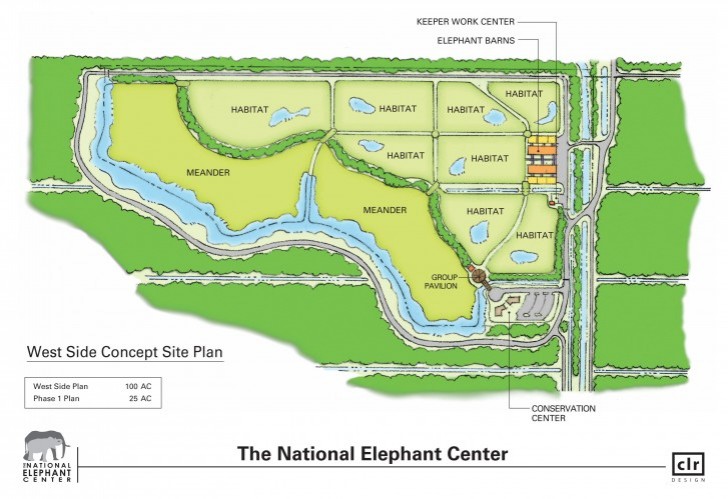
FELLSMERE — In the northwest-most corner of Fellsmere, a 225-acre elephant center will soon be breaking ground along Fellsmere Grade Road. The facility is expected to house about 10 African and Asian elephants in the first few years of operation.
Fellsmere City Manager Jason Nunemaker said the city had been in discussions with the National Elephant Center for the last few months, determining if there were appropriate lands for the facility and community support.
The National Elephant Center had been approved to locate to St. Lucie County but plans fell through, according to a press release issued by the center.
The center’s chairman, Rick Barongi, director of the Houston Zoo, said they looked at numerous locations for the facility and settled on Florida partly because of its partnerships with Walt Disney World and Busch Gardens. The two parks have accredited and expert veterinarians that care for elephants.
And while the center had planned to move to St. Lucie County, Fellsmere became a more optimal location, Barongi said, due to the availability of land for future expansion.
“This is by far the best site,” he said.
Sebastian River Area Chamber of Commerce Executive Director Beth Mitchell said she believes there is a need for such a facility.
“We need to be a kind and gentle society,” Mitchell said. “We need to help these creatures.”
Mitchell added that Fellsmere would be a “natural fit” for just such a facility.
“It seems to me it would be a great fit,” she said.
The facility is expected to be a professional elephant care center focused on advancing care of elephants, according to the National Elephant Center’s website. The center is also expected to become the epicenter for the Association of Zoos and Aquariums’ elephant population management, care and conservation.
The Fellsmere facility will be used for training elephant keepers, according to Barongi, helping to provide consistent care nationwide at accredited zoos.
The National Elephant Center plans to file its permits Thursday. In Fellsmere, the only permit needed is an administrative one that is expected to take a couple days to process, Nunemaker said.
Another permit required will be one from the St. Johns River Water Management District.
“We don’t see any issues,” Nunemaker said of the National Elephant Center receiving the permits it needs before getting started on the project.
Nunemaker said that the city did not need to entice the center to move to Fellsmere. Instead, the availability of land and the city’s receptive nature was all that was needed, he said.
Nunemaker said the facility is consistent with the city’s desires to preserve natural space and encourage conservation. Already, there are plans to extend the city’s greenway trail out to the facility.
“It marries up very nicely to it,” Nunemaker said of the facility and trail.
Though the center will not be open to the public, executives plan to offer access to local school groups as part of an educational program.
Barongi said a public center is “on the drawing board” for the second phase of the facility. He also plans to participate in public outreach and be open by appointment.
Construction on the $2.5 million first phase of the center is expected to be complete sometime next year. The project will include a large barn with attached paddocks, a keeper work center and four interconnected pastures. That pastures will include ponds, mud wallows, dust bathing areas, shade and other elephant-friendly amenities, according to the National Elephant Center.
Barongi said the facility will not only serve as a resource for accredited and member zoos, but also for private- and circus-owned elephants.
“We know there is a need,” he said for such a facility because member zoos have been asking for some time.
He explained that zoos with elephants might need to find temporary housing for the elephants when renovations are needed of the exhibit. Also, some zoos might find that they can no longer afford to keep their elephants and need to find a new home for them.
Breeding, too, is another service the facility could provide, by housing zoos’ male elephants, which require larger, stronger housing than what some zoos can provide.
Barongi said zoos could send their female elephants to the center for breeding, helping to expand on the conservation efforts.
The center could also be a place for elephants confiscated from inhumane situations. Barongi said that the center is not a sanctuary.
“It’s going to help elephants,” he said. “This will be something the region can be proud of.”



